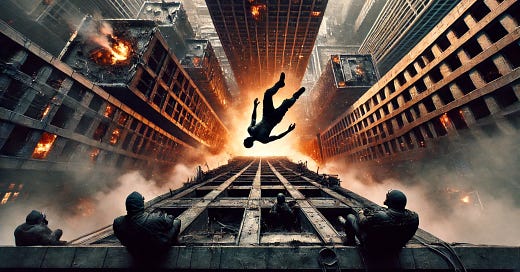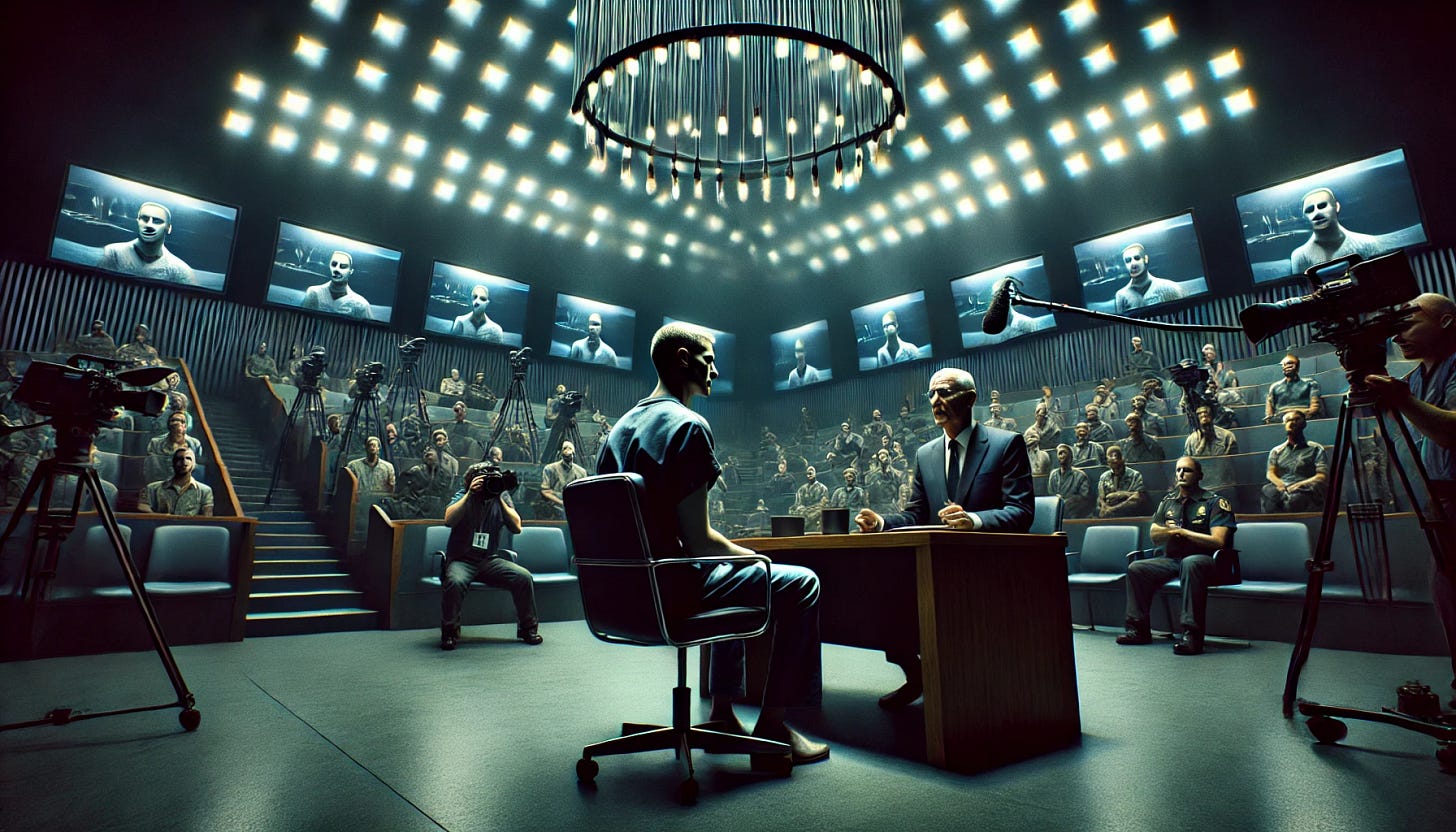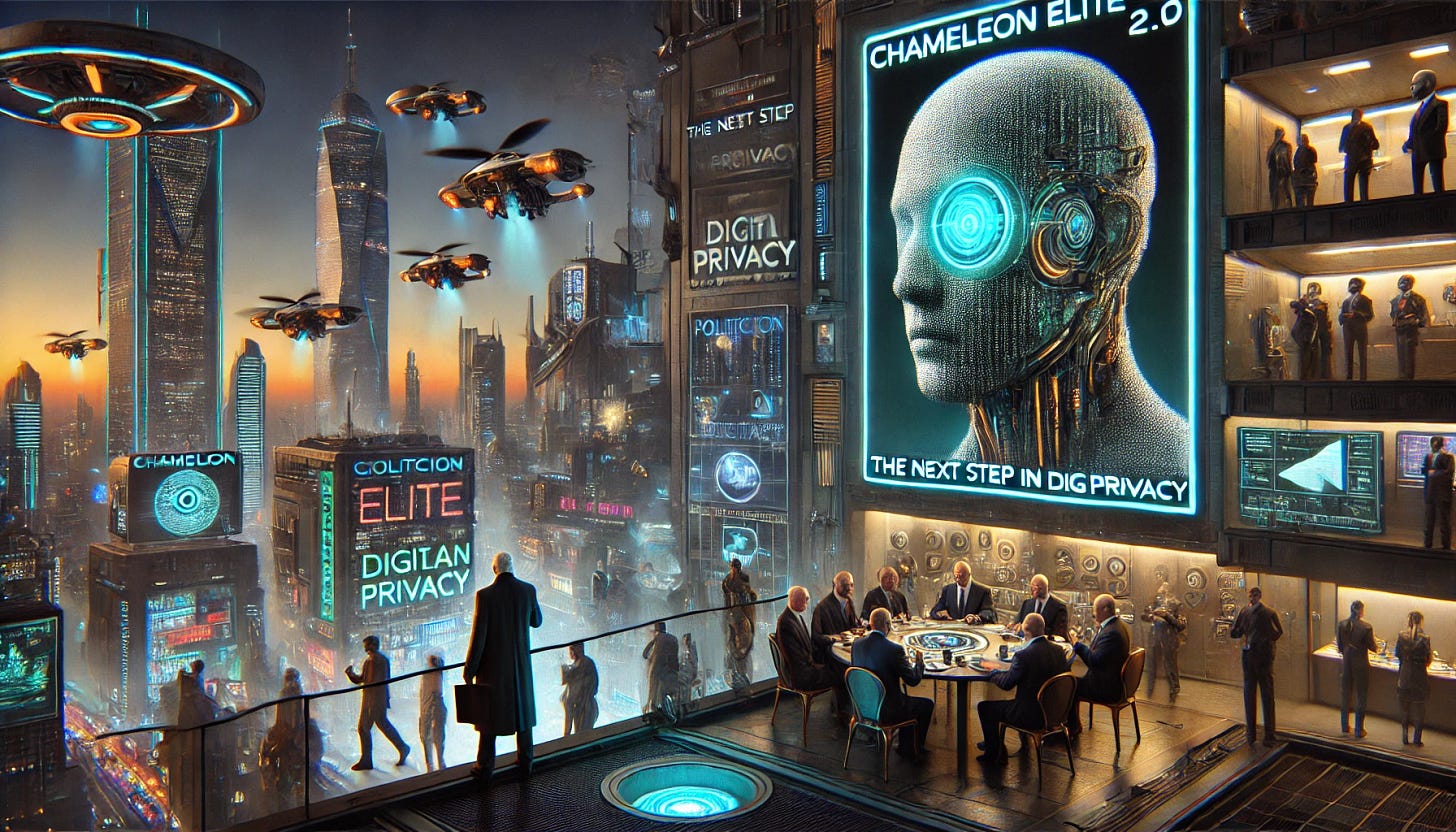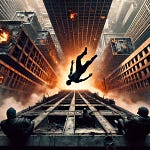The Interrogation
Silence. A deep, suffocating silence.
Then—a high-pitched frequency, humming just beyond human perception. It dug into Irides’ skull, vibrating through his teeth and setting his nerves on fire.
Then—agony.
A sharp, electric burst ripped through his head—not through his body, not the kind of pain that scorched the flesh. No, this was different. This was inside.
The restraints held him as he convulsed, his muscles locking, his vision flashing white, then black, then white again.
His mind chip fizzled.
The implant—already altered, already unstable—rebooted itself, rewriting, recalibrating.
His own memories fractured—lines of code breaking apart, reforming, shuffling like a corrupted file trying to reconstruct itself.
Then—nothing.
The next thing he was aware of was the voices.
Low. Steady. Measured.
The interrogators.
One stood in front of him. The other just behind his left shoulder. Their holograms flickered slightly, their projected outlines too crisp, too precise.
The restraints were still tight around his wrists. His breath was shallow, his skin damp with sweat. His vision swam as his mind struggled to focus.
Then came the question.
"Who are you?"
Irides blinked.
His lips parted. A breath escaped. His voice, when it came, was hoarse but certain.
"Jabari Okoro."
A beat. The interrogators did not move.
The one in front of him spoke again. "Say it again."
He swallowed. "Jabari Okoro."
The second interrogator nodded slightly, as if pleased.
"Now tell us—who is Jabari Okoro?"
The words came easily, effortlessly, like pulling up an archived file.
"Born in the Free Zone of Lagos. Citizen ID #8901-332. Smuggled into the Eastern US corridor through illicit transport channels. Initially operated under false credentials. Entered Down Man in 2072. Integrated into local underground culture to establish influence. Created Chameleon Tech as a subversive tool against the state."
The words poured out of him—dates, locations, details—without hesitation.
"Primary intent: destabilization of national security. Ultimate objective: overthrow of the surveillance state through systematic identity obfuscation."
His heartbeat was steady. His breathing even. The weight of his past—of everything that had brought him here—felt whole, clear, absolute.
He had always been Jabari Okoro.
Hadn’t he?
The first interrogator glanced at the second. A barely perceptible nod.
The second interrogator leaned forward, voice calm, assured.
"And who is Irides?"
Irides—no, Jabari—felt a flicker of something. A static pulse in his skull, something half-formed, like a memory hovering just beyond reach.
Irides.
A name. A ghost. A distortion.
Not real.
Not him.
He shook his head. "Irides was a fabrication."
The interrogators let the silence settle for a moment before continuing.
"Why did you create Chameleon Tech?"
Jabari didn’t hesitate.
“To weaponize identity. To disrupt state control. To make surveillance obsolete."
The second interrogator tilted its head. "And do you regret this?"
Another sharp flicker in his mind—something distant, almost painful.
A whisper of music. A synth beat. Fingers moving across a keyboard. A city of neon and shadows.
Then it was gone.
Jabari Okoro exhaled.
"Yes. I regret it."
The first interrogator took a step back. The second adjusted its badge insignia.
"Tomorrow, you will make a public statement. You will denounce Chameleon Tech. You will accept your crimes. You will tell the world who you are."
Jabari nodded.
"I understand."
He felt nothing.
No fear. No doubt. No resistance.
Because he was Jabari Okoro.
Wasn’t he?
The interrogators turned, walking toward the door.
The lights above flickered. The restraints hissed softly as they unlocked.
And as they left him alone in the sterile, humming room, Jabari Okoro sat motionless, staring at his reflection in the table’s polished surface.
A man he no longer recognized stared back.
The Show-Trial
Irides sat shackled before the tribunal. The room was cavernous and cold, a manufactured spectacle designed for obedience, not justice. Floodlights bore down from above, bleaching his skin to a pale, sickly hue.
Someone had combed his hair to make him look more presentable for the cameras. The contradiction was sickening—dress him up just enough so the public could recognize the man they had once admired, then watch him break in real time.
He had spent days in the dark, surrounded by nothing but the hum of electric locks and the occasional echo of distant screams.
The cameras framed him perfectly. Every network streamed the event, pushing it to every device in the country. Children saw it on their tablets. Workers on break glanced at it on wall-sized screens. No one missed the lesson being taught.
The lead prosecutor, a thin man with a manufactured smile, stepped forward. His voice rang through the chamber, smooth and confident, like a parent explaining a lesson to a misbehaving child.
“State your name for the court.”
A pause. A flicker of something deep inside him—something distant, half-buried.
Then, his voice, steady and clear:
“Jabari Okoro.”
The reaction was instant.
The crowd watching from the ruined sprawl of Down Man erupted.
Gasps, screams, curses.
The screen in the square showed him—the man they had known as Irides, now reduced to a fraud, a government-planted ghost, a hoax.
The riot began in full.
Windows shattered. Buildings burned. And no one stopped them.
Because no one cared what happened to Down Man anymore.
The prosecutor smiled slightly at the sound of chaos outside, as if he had expected nothing less.
“Tell us, Mr. Okoro. Why did you create Chameleon Tech?”
“My technology was… misguided,” he said. “I sought to free us from Big Other’s grip, but instead, I created chaos.”
“And do you admit that Chameleon Technology directly threatens national security?”
Irides forced himself to breathe evenly. A trickle of sweat slid down his back. This was it—the moment they wanted him to submit entirely, to denounce everything.
He looked past the cameras, past the judges, past the carefully selected “public observers” who were nothing more than silent actors in this production. Someone was still watching somewhere out there—someone who hadn’t given up yet.
“Yes,” he whispered.
But there was one final condition.
In exchange for his supposed freedom, Irides was forced to relinquish all control of Chameleon Technology, signing over its patents, source code, and encryption keys. The revolution he had built with his own hands was no longer his—it belonged to the very system it had been designed to disrupt.
And then, the final humiliation: he had to confess, publicly and officially, that he was not Irides at all. He had to say, in front of the entire world, that he was Jabari Okoro—a fabricated identity used to erase the revolutionary and replace him with a criminal.
The tribunal chair nodded in satisfaction. The gavel slammed down, sealing his fate.
Chameleon Elite
Chameleon Technology was dead. Or rather, it had been devoured by the very system it sought to undermine. No longer an open-source tool of liberation, it was now a luxury product, accessible only to the wealthy, the powerful—the ones who had never needed it in the first place.
The media no longer condemned it. Now they celebrated it.
“Chameleon Elite 2.0: The Next Step in Digital Privacy”
Politicians wore it to avoid scrutiny, celebrities used it to curate their images, and corporations installed it as a security measure, rendering identity verification obsolete.
For the masses, surveillance remained. But for those who could afford it, anonymity became the ultimate privilege.
When Irides—now officially and legally Jabari Okoro—was released, there were no cameras, no welcome, no redemption. He stepped into a world that saw him not as a visionary, but as a pariah. The name “Irides” was forbidden. The system had rewritten him as a disgrace, an example of what happens to those who defy Big Other.
He was given nothing. No home, job prospects, or way to escape the fabricated stain on his record. Beaten by vigilantes who still saw him as the villain the state painted him to be, he drifted through the slums, surviving off scraps, sleeping in alleyways lined with discarded holo-ads for Chameleon Elite 2.0.
The irony burned. His creation, meant to free the people, had become the ultimate tool of the elite. The very technology that could have saved him now concealed his oppressors.
The Kidnapping
They came for him in the dark.
Jabari Okoro had been a free man for exactly seven days. Seven days of wandering the edges of a city that no longer recognized him, of existing as a hollowed-out version of himself.
Seven days of watching Chameleon Elite turn his revolution into a commodity, a plaything for the powerful, while the people who had once followed him—who had believed in him—were left to rot under the unblinking eye of Big Other.
He knew he was being watched.
But he hadn’t expected them to take him so quietly.
Then came the boots. The fists. The metal pipe.
He didn’t fight back.
Because he didn’t know if there was anything left to fight for.
The Tower
They dragged him through the skeletal remains of a once-great city, past the ruins of neon-clad alleyways and dead security cameras, past the charred remains of a riot that had meant something before the state twisted it into another cautionary tale.
Upward.
They climbed the last standing tower in Down Man, a crumbling skyscraper that had survived the 2051 fires and the subsequent collapse.
A monument to falling men.
And now, they would add one more.
At the top, the Unseen gathered.
Hoods pulled over their faces.
They were no longer individuals.
They were vengeance made faceless.
They threw him onto the rooftop, the concrete scraping against his torn skin.
No words were exchanged.
They had already passed judgment.
The Breaking Point
The first blow sent his head snapping back.
The second rattled through his ribs.
The third, the fourth, the fifth—he stopped counting.
His body wasn't his anymore.
Just a bag of shattered bones, a puppet being broken apart at the joints.
But the real damage wasn’t to his flesh.
It was to the chip.
A crack. A pulse.
The failing implant inside his skull hiccuped—a brief, shuddering misfire.
Then it rebooted.
White light flooded his vision.
Data scrambled and reassembled in microseconds.
Memories fragmented, reset, reconnected—not the ones the state had forced into him, but the ones they had buried.
The hands striking him belonged to his people—not his enemies.
The ones who had followed Irides—who had whispered his name like a prayer—were the ones about to kill him.
Because they believed the lie.
They believed he was someone else.
And in that instant, he knew the truth.
They had not just erased Irides.
They had weaponized his memory against the very people he had sworn to protect.
Big Other hadn’t needed to destroy him.
They had simply rewritten him.
And the people had done the rest.
His vision snapped into focus.
His mind restructured itself.
And as he spat blood onto the rooftop, the words left his lips before he even realized he was speaking.
“They played us all.”
Irides’ Fall From One World Trade
The wind tore past his face like the scream of history itself.
The sky above—gray, bruised, infinite—offered no comfort.
The jagged ruin of One World Trade had once pierced the clouds, a symbol of resilience, of memory, of the world’s attempt to rebuild. Now it served another purpose.
A sacrificial altar.
The Unseen, once his disciples, now masked executioners, had dragged him to its summit. There was no trial. No final words. Just judgment.
They didn’t see Irides.
They saw Jabari Okoro, the traitor.
The liar.
The one who bent the revolution into a loop and handed it back to their enemies.
They had stopped believing in faces.
And now, they would offer his body to gravity, in a ritual echo of those who fell in 2001 and again in 2051—those who had no choice but to jump.
This was his penance.
As he fell, the world seemed to slow.
The horizon blurred, the city beneath him warped. His brain chip, already damaged, scrambled in real time—glitching, seizing, rebooting, not in clean lines of code but in thoughts, memories, and questions too large to answer.
What is identity? What was mine? Irides thought in his final fractions of a second.
Who decides what we are?
And how long can control last when people begin to see the wires behind the illusion?
He could feel the flickering threads of Irides—the music, the movement, the face projected in defiance over Fallen Towers Park—beginning to surface.
And the scripted confession of Jabari Okoro fading into a smudge.
The world did not end when Irides fell.
No regime collapsed. No fire rose from the ashes. The towers of Plutopia still pierced the clouds, untouched by the flames of the streets below. The drones still swept their searchlight cones across the dark. The markets opened. The feeds flowed. The algorithms adjusted.
And yet—something had changed.
Down Man remained a ruin in every visible way. Power grids failed more often than they worked. Water ran cold, dirty, and infrequent. The only laws enforced were those of necessity and silence. It was a city that had learned not to speak aloud, because language, like identity, could be used against you.
But beneath that silence, something pulsed.
AYA
They called her Aya, though that name, like all names in Down Man, was only a suggestion. She had no tags, no records, no origin approved by the Identity Bureau.
She was the one watching from below, waiting for Irides to hit the pavement.
She had calculated the trajectory from the wind shear off the skeletal tower. Studied the drone footage leaked in fragments by rogue signal brokers. Mapped it against grainy surveillance from ruined CCTV archives.
She did not cry when they threw him.
She did not scream.
She listened. And waited for Irides to land.
And when Irides hit with a thud, she waited some more—as if she expected his ghost might rise and reassemble itself pixel by pixel beneath the flicker of old neon.
When the crowd of masked mourners turned executioners finally dispersed—when the final chants had faded, and the ritual was complete—Aya stepped forward.
Alone. Unhurried. Unafraid.
She moved like someone completing a sacred rite.
She whispered, “We’ve made it such that falling may be the only way to rise. And may you rise again, Irides.”
And there he was at her feet.
Crushed. Broken. Half-buried in the debris of his own mythology.
A man is no longer just a husk of bone, blood, and legend.
But Aya hadn’t come for his face.
His face had lied to the world, whether worn by Irides or Jabari.
The face was mutable. A mask. A trick.
She had come for the thing that couldn’t lie.
The part of him no state could fully rewrite.
His mind.
With steady fingers, she knelt beside the wreckage of the man they had tried to erase. Not with pity. Not even with reverence.
With precision.
She peeled away what remained of his scalp—torn, charred, glistening with heat—searching beneath the shattered skull until her fingers found it:
The neural core.
Fractured, pulsing.
Still humming like the dying echo of a song half-remembered.
It was damaged—deeply. But it was not dead.
Not yet.
Aya lifted it free and cradled it like a newborn heart. It was warm against her palm. The heat of memory refusing to vanish.
What are you doing? a voice asked in her mind—her own voice, doubtful, weary.
What can you do with a ghost?
She had no answer.
Only this:
They threw down a man.
But I’ve found a signal.
This was not an act of resurrection.
Not yet.
It was salvage.
It was refusal.
It was a quiet rebellion against oblivion.
Because when they cast Irides from the tower, they thought the story ended.
But stories like his don’t end.
They scatter.
They encode themselves into others.
They wait.
And tonight, Aya was no longer waiting.
She slipped the chip into her coat.
The body behind her was still.
But something new was beginning.
Not a man.
Not a leader.
A seed.
Irides would not rise again as a man.
That age had passed.
But the codex that had once lived in his mind—part manifesto, part virus, part song—was still alive in fragments. Broken data. Stolen memory. Embedded truths too chaotic for Big Other to digest.
The system believed it had won. It had erased the name.
But what it failed to erase was the idea.
The belief that identity, once freed from control, could not be caged again.
The people of Down Man still moved like ghosts. But there was a new kind of whisper in the alleys and between the walls—not one of fear, but of remembering.
Some said they’d heard Irides’ voice in the static between broadcast signals. Others found unauthorized patches in their facial scramblers—code signed with a symbol no one had seen in years: a prism of fractured light, shifting, like oil on water.
They didn’t know where it came from.
But some began to smile when they saw it.
Some began to wear it again.
Not on their faces.
But beneath them.
Hope, in Down Man, was not something you claimed.
It was something you passed, quietly, hand to hand, like contraband.
Like the chip Aya now guarded.
It was not much.
But it was enough.
A whisper.
A spark.
A seed.
So the struggle continues—one heart at a time.
And in the distant corners of the failing network grid, where no one is supposed to exist, a question still lingers like a pulse:
Who decides what we are?
And what happens when we decide for ourselves?
© Michael Arturo, 2025
Read Part One below …
“Down Man 2084” is a Top in Fiction’s selection for Spec-Fict Short Series
If you appreciate the content
Buy Me A Coffee
Support by hitting the like button or leaving a comment.
Welcome to Michael’s Newsletter. Writer of contemporary political/social commentary, parodies, parables, satire. Michael was born and raised in New York City and has a background in theater and film. His plays have been staged in New York, London, Boston, and Los Angeles.
Michael also writes short literary fiction.




















Share this post